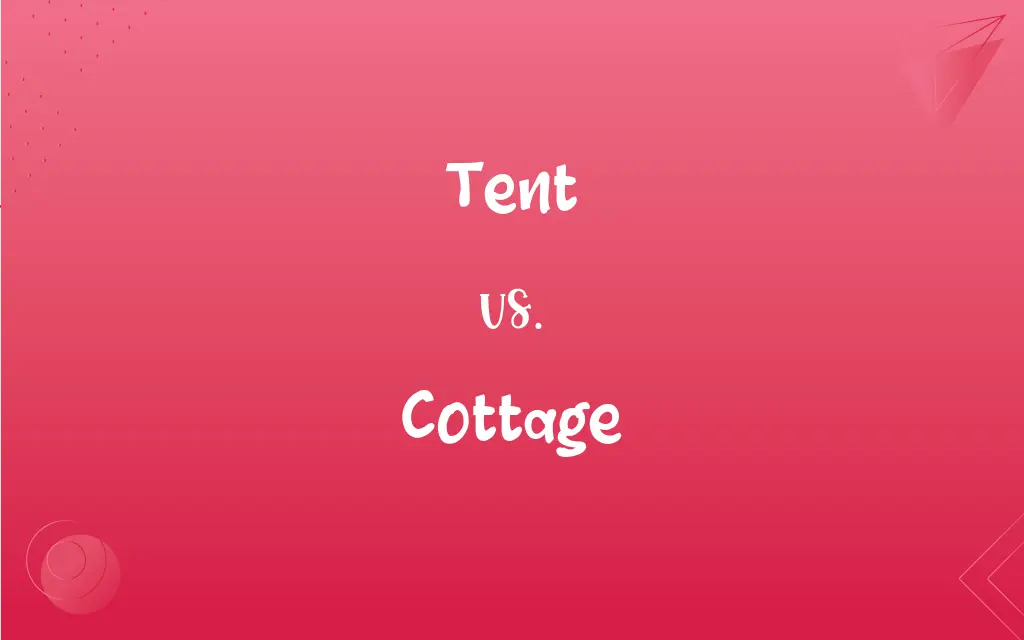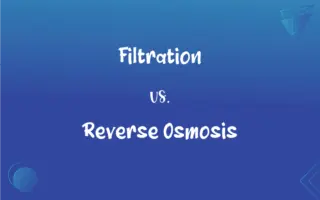Tent vs. Cottage: What's the Difference?
Edited by Aimie Carlson || By Janet White || Published on December 17, 2023
A tent is a portable shelter made of fabric, supported by poles and ropes, whereas a cottage is a small, typically cozy house, often in a rural or semi-rural location.

Key Differences
A tent is designed as a temporary shelter, often used for camping or outdoor activities, made of canvas or similar material. In contrast, a cottage is a small, permanent residential structure, usually made of wood, stone, or brick.
Tents are characterized by their portability and ease of assembly, suitable for travel and temporary stays. Cottages, however, are fixed structures, offering more stability and amenities, often used as vacation homes or rural dwellings.
The functionality of a tent centers on basic shelter from the elements, primarily used for short-term accommodation. A cottage, on the other hand, is equipped for longer stays, often with complete living facilities including a kitchen, bathroom, and sleeping areas.
From an architectural perspective, tents have a simple design focused on mobility and ease of setup. Cottages exhibit more complex architectural features, often with unique designs reflecting cultural or historical influences.
In terms of comfort and amenities, tents offer a minimalistic approach, aligning with outdoor, adventurous lifestyles. Cottages provide a homely environment, often in scenic locations, suitable for relaxation and extended stays.
ADVERTISEMENT
Comparison Chart
Structure Type
Portable, temporary shelter
Permanent, small house
Construction Material
Fabric, supported by poles and ropes
Wood, stone, or brick
Primary Use
Camping, outdoor activities
Residential, vacation home
Features
Basic shelter, easy setup
Full amenities, stable construction
Suitability
Short-term stays, minimalistic living
Longer stays, comfortable living
ADVERTISEMENT
Tent and Cottage Definitions
Tent
A flexible shelter used in camping or emergencies.
Emergency tents were set up after the earthquake.
Cottage
A small, cozy house, often in a rural setting.
They rented a cottage in the countryside for the summer.
Tent
A portable shelter made of canvas or similar material.
We pitched our tent by the lakeside.
Cottage
A vacation home, often found in picturesque settings.
They own a small cottage in the mountains.
Tent
A collapsible shelter of fabric stretched and sustained by poles.
The festival was full of colorful tents.
Cottage
A small house with traditional or charming characteristics.
The old cottage had a thatched roof and a flower garden.
Tent
A temporary structure for outdoor accommodation.
They slept in a tent during their hiking trip.
Cottage
A simple, single-story dwelling, typically in a rural or semi-rural location.
Her cottage by the sea was her favorite getaway.
Tent
A nomadic or temporary dwelling.
Nomads have used tents as homes for centuries.
Cottage
A term for a quaint or charming small house.
The artist lived in a secluded cottage surrounded by woods.
Tent
A portable shelter made of fabric or other material stretched over a supporting framework of poles and usually stabilized or secured to the ground with cords and stakes.
FAQs
What is the primary purpose of a tent?
For temporary shelter, often used for camping or outdoor activities.
How long does it take to set up a tent?
It varies, but many modern tents can be set up in a matter of minutes.
Do cottages always have a rustic design?
Not necessarily, some cottages have modern designs but are still small and cozy.
Is it common to rent cottages for vacations?
Yes, cottages are a popular choice for vacation rentals.
Can cottages be used as permanent homes?
Yes, cottages can serve as primary residences, especially in rural areas.
Do tents provide insulation?
Basic tents offer limited insulation, but some are designed for colder conditions.
Can cottages be found in urban areas?
Rarely, as they are typically associated with rural or semi-rural settings.
Are tents eco-friendly?
Many are made with eco-friendly materials and have a minimal environmental impact.
Can tents withstand strong winds?
High-quality tents are designed to be sturdy, but extreme conditions can be challenging.
Are tents waterproof?
Modern tents are usually designed to be water-resistant to some degree.
Can tents accommodate families?
Yes, there are larger tents designed to accommodate multiple people.
Are cottages a good investment?
They can be, especially in popular vacation areas or scenic locations.
Is it easy to transport a tent?
Yes, most tents are designed to be lightweight and easily portable.
Can cottages be off-grid?
Yes, some cottages are designed to be self-sufficient and off-grid.
Are cottages expensive to maintain?
Maintenance costs can vary depending on the age, size, and location of the cottage.
Are tents safe from wildlife?
Tents offer basic protection, but precautions should be taken in wildlife-rich areas.
Are there energy-efficient cottages?
Yes, many new or renovated cottages are designed with energy efficiency in mind.
Do cottages come in different styles?
Yes, cottage styles can vary widely, reflecting local architecture and culture.
Can cottages be modernized?
Yes, many cottages are updated with modern amenities while retaining their charm.
Do tents need special care for storage?
Yes, tents should be dry and clean before storing to prevent damage.
About Author
Written by
Janet WhiteJanet White has been an esteemed writer and blogger for Difference Wiki. Holding a Master's degree in Science and Medical Journalism from the prestigious Boston University, she has consistently demonstrated her expertise and passion for her field. When she's not immersed in her work, Janet relishes her time exercising, delving into a good book, and cherishing moments with friends and family.
Edited by
Aimie CarlsonAimie Carlson, holding a master's degree in English literature, is a fervent English language enthusiast. She lends her writing talents to Difference Wiki, a prominent website that specializes in comparisons, offering readers insightful analyses that both captivate and inform.






































































